Survey Results on the Language Policy at TH Köln - Student Results
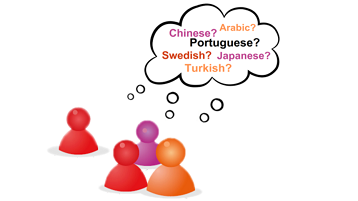
In the autumn of 2023 we asked for your opinion on the language-related offers at TH Köln. Please find the most important results here. We would like to thank all students who took the time to participate in the survey!
The survey results provide a basis for developing an institutional language policy at TH Köln and for defining objectives and measures. Your feedback thus makes a valuable contribution to the needs-oriented further development of our university's language offers.
Who participated in the survey?
The survey was open from November 13th to December 18th, 2023. During this period, a total of 1,145 students* completed the online questionnaire. The highest participation was from students in the Faculty of Information and Communication Sciences (21.5% of the feedback), the Faculty of Applied Social Sciences (16.1%), and the Faculty of Computer and Engineering Sciences (10.8%). Most feedback came from undergraduate and lower semester students.
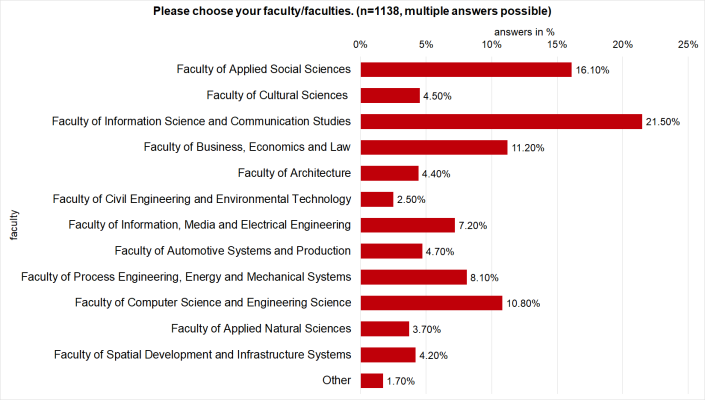 Chart: Feedback by faculties
(Image: TH Köln)
Chart: Feedback by faculties
(Image: TH Köln)
71.8% of the surveyed students have German as their first language. Other frequently mentioned first languages are Turkish (7.7%), Spanish (6.5%), and Arabic (6.1%).
Most students had already learned English as a foreign language before starting their studies at TH Köln (87.3%), followed by French (46.2%) and Spanish (32.0%).
A large percentage of the particpants have already gained international experience: Before starting their studies at TH Köln, almost one-third (30.4%) of the participants had spent more than three months in a country in which their first language is not spoken. In most cases, this refers to international students who already lived in Germany before starting their studies (19.6% of students with international experience). However, many students also had longer stays abroad in Spain (10.2%), France (8.5%), or in English-speaking countries such as the USA (8.5%), the United Kingdom (7.9%), Australia (7.0%), New Zealand (5.8%), Canada (4.1%), and Ireland (2.9%) before commencing their studies at TH Köln.
*Minor differences in response rate per question
Language Needs and Use of Services at the Language Learning Center
Students were asked to self-assess their language skills in various situations of university life by evaluating different statements on a four-point scale from "applies" to "does not apply" (e.g., "I can read scientific texts.").
Using the German language in university life presents particular challenges for students with a first language other than German. Only 57.6 % of the students from this group say that the statement "I can write scientific texts." "applies" or "rather applies" to them. The statement "I can express myself orally in seminars." is rated as "applies" or "rather applies" by 63.6 %. Attending lectures (75.3 % "applies" or "rather applies") and having conversations with fellow students (78.0 %) is experienced as less challenging.
Students with German as their first language report significantly fewer difficulties in everyday university life. Although writing academic texts is perceived as the greatest challenge by this group, 97.4% still rate the statement "I can write academic texts." as applicable or rather applicable.
With regard to the English language, a similar picture emerges as far as writing scientific texts is concerned. The statement "I can write scientific texts" is rated as "applies" or "rather applies" by 92.2 % of students with English as their first language and by 73.7 % of students with a first language other than English.
When asked in which languages students would like to expand their language expertise or which new languages they would like to learn, three of the languages already offered at the Language Learning Center are in the TOP 5, namely Spanish (28.6%), French (22.8%), and English (20.0%). In addition, respondents expressed interest in learning Japanese (27.0%) and Arabic (26.5%). Other Asian languages such as Korean (17.0%) or Chinese (Mandarin, Putonghua, Guoyu) (16.0%) are also in demand among students.
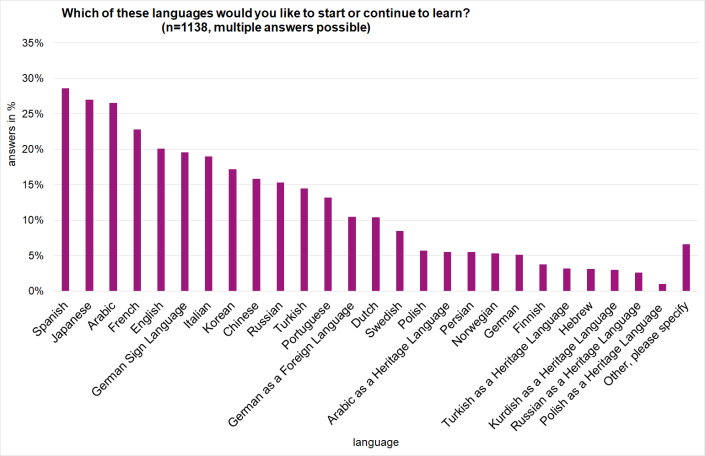 Chart: Languages students would like to learn
(Image: TH Köln)
Chart: Languages students would like to learn
(Image: TH Köln)
The main motive for learning foreign languages named by students of TH Köln is a general interest in languages and culture. Many are also motivated by considerations of their future career (61.8%). Vacation and leisure time (46.7%) motivate students to expand their language competencies as well. For nearly a quarter of the respondents, studies (22.7%) or a study-related stay abroad (24.8%) are reasons to learn additional foreign languages.
41.9% of the surveyed students already use the services of the Language Center to work on their language competencies, another 32.7% plan to take advantage of the Center's programs.
Nearly all surveyed students (99.1%) wish to acquire general language skills in the courses offered by the Language Learning Center. Oral interaction (e.g., discussions; 97.2%), listening comprehension (97.1%), and reading comprehension (95.7%) as well as intercultural aspects (91.0%) are also mentioned by a large majority as particularly relevant for their purposes. Multiple answers were possible.
Role of Languages in Teaching and Studies
Students attend lectures at their faculties in both German (59.2%) and English (49.6%). However, more than half of the students (59.3%) feel that the rate of foreign-language lectures offered in their studies is too low.
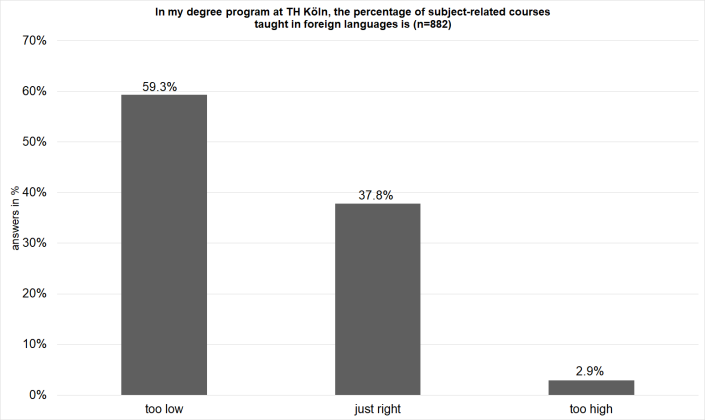 Chart: Courses taught in foreign languages
(Image: TH Köln)
Chart: Courses taught in foreign languages
(Image: TH Köln)
When asked whether ECTS points for attending courses at the Language Center can be accredited to their degree program, more than half of the surveyed students (53.6%) did not know. An additional 33.0% find the number of ECTS points they can earn by attending language courses too low - in most cases, it is 5 or 6 ECTS points.
Study-Related Experience Abroad
18.6% of the surveyed students have already completed at least one stay abroad as part of their current studies. 36.8% plan to go abroad during their current studies, another 24.9% are still unsure. Most students planning a stay abroad would like to spend a semester at a foreign university (75.0%). The most popular target countries are Spain (33.9%), the United Kingdom (28.7%), Japan (27.5%), and the USA (27.0%). For the preparation or follow-up of a stay abroad, general university-specific language courses (96.3%) or subject-specific language courses (85.3%) are the tools of choice for most students.
Language Tests and Examinations
In the survey, we wanted to know which language tests or exams were significant for students or which language exams they would like to take. For most respondents, the exams in question are unknown or currently not relevant. Among the exams that students would like to take, the Cambridge Esol exams (16.5%) and the TOEFL (14.0%) were mentioned most frequently. 15.2% of students have already passed a Cambridge exam in English and 14.3% a DELF/DALF exam in French.
Information Offered by TH Köln
The information and explanations provided by TH Köln in German are considered understandable by most of the surveyed students. On a scale from "applies" (=1) to "does not apply" (=4), the mean value for E-mail circulars, information on the website and social media posts is 1.3. Print media as well as signage in the canteen and in the buildings are perceived as only slightly less comprehensible (mean value 1.4).
The information and explanations in English are even rated slightly better than those in German. The mean value for E-mail circulars, information on the website and social media posts is 1.2. Print media and signage in the canteen and in the buildings are again perceived as slightly less comprehensible (mean value 1.3).
19.1% of the respondents are in favor of the provision of information and explanations in languages other than German and English. Most wish for information in Spanish (47.8%), Arabic (46.3%), and French (40.8%). Multiple answers were possible.
Visibility of the Language Learning Center
The Language Learning Center seems to be well-known among students: 90.4% of respondents knew of this Center before starting the survey. Students typically learn about the Language Learning Center through the TH Köln websites (60.2%), emails from the university distribution list (46.6%), or from fellow students (16.8%) or instructors/staff members of the university (16.8%).
Students primarily associate the Language Learning Center with motivating teachers (91.4%) and needs orientation (76.0%). However, the facility is also strongly perceived as a point of contact for language-related inquiries (81.6%). 90.7% of the surveyed students would recommend the Language Learning Center.
Generally, the website is the place to go for most students when seeking information about language offers at the university (83.6%). Emails via the university distribution list (60.7%) and social media platforms like Instagram (15.6%) are also used as sources of information. On-site information services, such as information events (12.4%), welcoming events for first-year students (11.2%), or printed materials (10.8%), are less commonly used as sources of information.
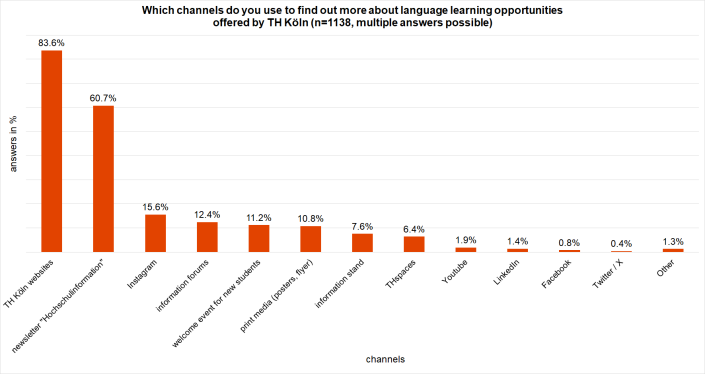 Chart: Information channels used by students
(Image: TH Köln)
Chart: Information channels used by students
(Image: TH Köln)
July 2024
